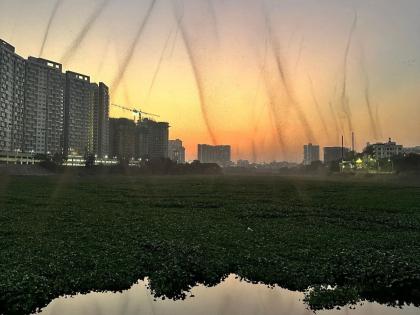Mosquito Swarm in Pune? Tornado-Like Swarm in Keshavnagar-Mundhwa Area Not Mosquitoes, Say Experts
By Lokmat English Desk | Published: February 13, 2024 05:22 PM2024-02-13T17:22:00+5:302024-02-13T17:22:06+5:30
Recently, a video has gone viral on social media websites, claiming that a swarm of mosquitoes in Pune's Keshavnagar-Mundhwa ...

Mosquito Swarm in Pune? Tornado-Like Swarm in Keshavnagar-Mundhwa Area Not Mosquitoes, Say Experts
Recently, a video has gone viral on social media websites, claiming that a swarm of mosquitoes in Pune's Keshavnagar-Mundhwa Area hovers over the Mutha River. In the video shared on Instagram, a dense cloud of mosquitoes can be seen forming a swirling vortex near the riverbanks.
However, experts say that it is not a mosquito swarm but rather insects belonging to the mosquito family. They note that these insects are unharmful to human beings as they don’t bite but rather indicate serious integrated sewage issues in water bodies. The presence of swarms of mosquitoes hovering over the Mula River and nearby areas has become a major cause of concern for residents. Experts attribute the mosquito menace to hyacinth overgrowth across the city.
Hemant Ghate, a scientist and former head of the Department of Entomology at Modern College, has studied insects found in water bodies over the years. He mentions that the insects seen in the viral video appear to be mosquito-like but cannot cause diseases in humans. They are commonly found along water bodies, especially those with higher organic substances, as reported by Hindustan Times.
Thanks @PMCPune for giving Valentine gift of Mosquitoes Tornado to Keshav Nagar Pune Residents in return to their timely municipality tax payments.#Justiceforkeshavnagar@ThePuneMirror@CMOMaharashtra@PMOIndia@PuneCivic@eshan_tupe@eshan_tupe@WagholiHSA@ShivSenaUBT_pic.twitter.com/iQxSb5tj8Y
— Rakesh Nayak (@Rakesh4Nayak) February 8, 2024
“These insects are normally seen during evening hours, and they have appeared at various places in Pune city before. This is the breeding season for these insects, which generally have a short life span of 24 hours. Similar phenomena are likely to be seen at least two to three times in the next two months,” said Ghate. An insect expert from the Wildlife Institute of India (WII), speaking on condition of anonymity, stated, “Mosquitoes fly only up to tree height, i.e., around 20 feet, and they don’t form tornadoes in swarms. Swarms usually consist of randomly flying mosquitoes aggregating.”
These insects serve as indicators of serious sewage issues in water bodies. Their presence suggests an immediate need for intervention in river cleaning, according to Ghate. “Keshavnagar and Mundhwa residents are already suffering due to water scarcity, bad roads, air pollution, and encroachments. Now, mosquito menace is another addition to the list. The authorities are neglecting these issues, making it the worst place to live in the city,” said Mihir Barot, a resident of the Mundhwa area, reported by HT.
Ravindra Andhale, the regional officer of the Maharashtra Pollution Control Board, stated, “We haven’t received any complaints about the issue yet but have issued notices to PMC and PCMC for not taking strong action to curb the problem of untreated sewage water.” The untreated sewage water mixing into rivers and other water bodies is leading to rising hyacinth and mosquito and other insect menace.
Open in app